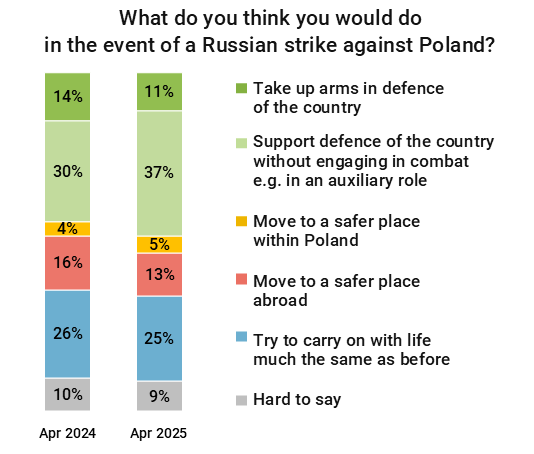14/2025
2025-06-04
Are Poles Afraid There Will Be a War Between Russia and NATO? What Would They Do if There Was?
Fears that the Russian–Ukrainian war could spread to NATO countries are lower now than in April 2024.
If, however, Russia were to attack Poland, the commonest strategy declared by those surveyed (37% this year, 30% last) would be to support the country’s defence, but without participation in actual combat. Only 11% of respondents would take up arms, compared with 14% last year.
A large group (18% this year, 20% last) said that in the face of such an attack they would move to a safer place, overwhelmingly choosing somewhere abroad.

|
Plans or strategies are one thing; something else altogether are specific, realistic actions undertaken in connection with such a potential threat. Fewer than one in five people know what they ought to do in the event of war, and only a similar number have checked their local area for places to shelter during an air raid. Only 3% of respondents said they had had any military training, down from the previous year’s 7%. On the other hand, the tendency to hoard food, water, medicines and other essentials has risen from 7% to 12%.
In this context it is particularly heartening that three quarters of those surveyed say they are able to administer first aid to someone who needs it.
More on this subject in the CBOS report.
This ‘Current Events and Problems’ survey (420) was conducted using a mixed-mode procedure on a representative sample of named adult residents of Poland, randomly selected from the National Identity Number (PESEL) register. Respondents independently selected one of the following methods: Computer Assisted Personal Interview (CAPI); Computer Assisted Telephone Interview (CATI), respondents receiving researchers’ telephone numbers in an introductory letter from CBOS; Computer Assisted Web Interview (CAWI), where respondents filled in the online questionnaire independently, gaining access by means of a login and password provided in an introductory letter from CBOS. In all three cases the questionnaire had the same structure and comprised the same questions. The survey was carried out between 3–13 April 2025 inclusive on a sample of 1030 people (65.5% using the CAPI method, 19.9% CATI and 14.6% CAWI). CBOS has been conducting statutory research using the above procedure since May 2020, stating in each case the percentage of personal, telephone and internet interviews.





